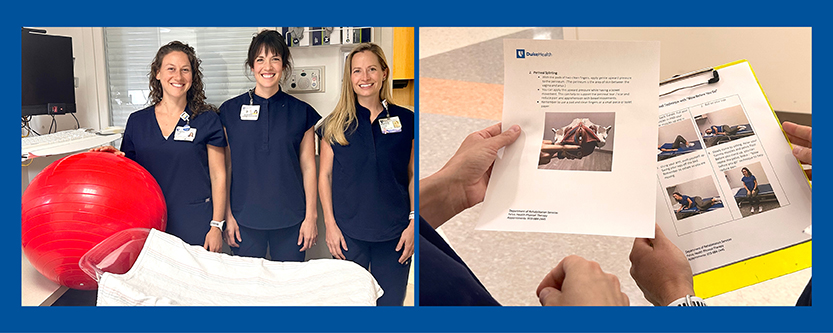Duke Health Inpatient/Telehealth Postpartum PT Program Benefits Patients

Patients who give birth at Duke University Health System now benefit from a unique inpatient physical therapy program specifically structured to address postpartum needs. Duke Health is one of a limited number of health systems in the country to offer this type of program, which was conceptualized two years ago by an innovative, multidisciplinary team of physical therapists and ob/gyns. The program launched in August 2023.
Physical therapists Jennifer Thornton-Jones, PT, WCS; Amanda Heath, PT, DPT, WCS; Valerie Adams, PT, DPT, WCS; Lisa Massa, PT, WCS; Erick Fink PT, DPT; and Jennifer Bartlett, PT, DPT; in partnership with ob/gyns Clayton Alfonso, MD; and Angel Nieves, MD, PhD, developed a strategy to address pressing patient concerns about not having access to inpatient physical therapy after giving birth. The goals of the program at Duke are:
- To provide obstetric patients delivering at Duke University Hospital with access to pelvic health specialists/physical therapists with specialty training (on an inpatient basis). Patients can request inpatient physical therapy at DUH during their admission, and if staff are available, they can be seen (Monday through Friday).
- To provide inpatient obstetric patients with information about telehealth follow-up appointment options to improve the continuum of physical therapy care. Patients recovering outside of Duke University Hospital will be able to schedule this service as well. Patients or providers may call 919-385-3028 to schedule telehealth therapy.
- To better identify musculoskeletal issues earlier in the postpartum time period and assist with connecting patients to outpatient women’s health physical therapy.
- To improve access to outpatient postpartum physical therapy services.
“This program started after many patients discussed a desire to have early access to pelvic physical therapy while in the hospital to better help themselves accomplish their goals at home. With more data suggesting postpartum patients have a touchpoint with a health care provider in the first two weeks after delivery, this service is helping us to accomplish this goal to not only help with their physical therapy needs, but also to catch early warning signs of other postpartum concerns,” said Dr. Alfonso.
Training the Team
The program also hopes to improve access to physical therapy for pregnant patients by offering advanced training for nearly 60 physical therapists at Duke Health. The training provides a specific focus on pregnant and postpartum patients with musculoskeletal concerns and includes education about maternal medical risks. These medical risks include pregnancy-related pelvic girdle pain and lower back pain; assessment/treatment considerations; and educational screening for pelvic floor dysfunction. If pelvic floor dysfunction is identified, patients can transfer to a pelvic health specialist as needed. Yearly training and refresher courses for interested physical therapists will be available through the program. To date, 31 orthopedic physical therapists have undergone training.
Through the efforts of the multidisciplinary team, the inpatient pelvic health service now offers availability Monday through Friday, five hours a day. As a part of this service, a new referral type, which differentiates postpartum/pelvic physical therapy from mobility-based physical therapy, has been added (“Physical Therapy Postpartum Evaluation and Treat”).
Patients also benefit from education on recovery after delivery. Referral indications for physical therapy include: post c-section, perineal tears, pelvic girdle pain in pregnancy, coccygodynia (a painful syndrome affecting the tailbone/coccygeal region) and pelvic organ prolapse, among others.
“We welcome the opportunity to collaborate with our ob/gyn colleagues to address the modifiable risks that some of our postpartum patients experience,” said Lisa Massa, PT, WCS.

Photo credits: K’mari Peede
Looking ahead:
In addition to these new patient-centered care options, there are plans to provide:
- Exercise programs for pregnant patients who have been admitted for hypertension
- Pain management strategies for patients with lumbar spine or pelvic girdle pain who are being discharged home
- A workflow for Duke providers who deliver at WakeMed hospitals so they are able to directly refer their patients

In February 2025, members of the program presented “Implementation of an Obstetric Physical Therapy Care Pathway: Inpatient and Telehealth Postpartum Rehabilitation” at the American Physical Therapy Association National Combined Sections meeting.
.